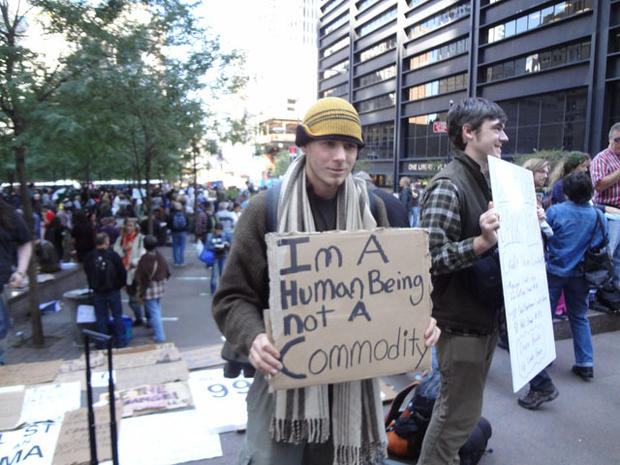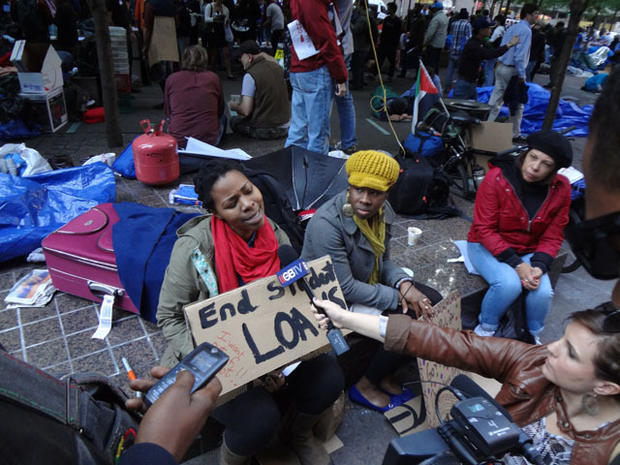Occupy Wall Street: The scene on the ground
NEW YORK - It was nearly noon on Wednesday morning, and many of the demonstrators who had gathered to "Occupy Wall Street" - that is, sleep, eat, hang out and, sometimes, protest against greed and economic inequality in Zuccotti Park in the Lower Manhattan - were just waking up.
Sleeping bags - makeshift and otherwise - dotted the park, some still containing the protesters who effectively took over the park two-and-a-half weeks ago, with the grudging acquiescence of the New York Police Department. Many fit the expected profile of the left-wing demonstrator - young, pierced, earnest - but, as befits a protest that backers proudly describe as lacking one clear mission, the crowd was far from uniform.
On one side of the park, near piles of signs with messages like "No Banker Left Behind," "ban fracking," and "end student loans," a young African American from Brooklyn who gave his name as Dilinga was holding court. (Asked his age, he replied, "old enough.")
"Everything is pro-military on TV," he complained. "Go Army, go Navy, go Marines, go Air Force. But what are you giving to the people? Nothing. Nothing. It's like you're living in welfare when you go to the Navy or the Army. You're just getting a free roof and free food and getting a little salary. But your salary is under $30,000. You're still in poverty and being used to kill people."
Across the park, as one of the dozens of reporters circling the protesters affixed a camera on her, a girl who looked like she had skipped high school for the day took a decidedly less serious tone. "It's an occupation, yeah!" she exclaimed sarcastically, her hands around a coffee cup, a sheepish smile on her face.
Meanwhile, groggy demonstrators found their way to the makeshift kitchen in the middle of the park, where food donated by sympathizers - much of it vegan - was being given out. After nearly three weeks of the "occupation" -- which began as a relatively small protest in response to a call from anti-consumerist magazine Adbusters -- a semi-functioning society has sprung up.
Barred by police from using megaphones, protesters created a structure whereby whoever is speaking says his piece, and then the rest of the crowd repeats it, a call-and-response system that ensures the words echo through the park. They use the system at a daily "general assembly" to make collective decisions for a leadership movement on topics like whether they should invest in cheap sleeping bags for the new arrivals. For bathrooms, they head to the nearby McDonalds; for wireless service, some stand outside the Starbucks down the street.
The demonstrators acknowledge that their burgeoning movement is still finding its feet, as Brendan Burke, a 41-year-old truck driver serving both as a security and communications operative, told a reporter. (Just that morning, veterans of the "Battle in Seattle" protest had suggested an organizational structure that the Occupy Wall Street protesters were considering adopting.) But he said that while there are a variety of individual demands, there is a unifying theme - anger at the "economic war" being waged by the nation's wealthy, who take advantage of an economic system that benefits the very few.
Unions add strength to Wall St. protests
Anti-Wall St. protest spawns others across U.S.
Photos: Wall Street protests
"It's not like 'get the king out of the castle,'" he said. "It's 'get the system out of my house.'"
"We have a rallying cry - the anger with Wall Street, the economic inequality and greed. It's simple," added Adam Ash, a 55-year-old South Africa native who spent the previous night sleeping in the park. "When people say we don't have demands - we do have a demand. We want to point out the massive inequality - economic, social inequality."
Almost no one at the protest seemed to have much positive to say about President Obama and the Democratic Party, which was described as only slightly less corrupt and focused on helping the rich than the GOP. They also had little positive to say about the "corporate media," which they said was unwilling to tell Americans the truth.
Trevor Roulstin, a 25-year-old cook from Durango, Colorado who has been sleeping in the park for eight days, said he had "come [to] see for myself what is happening here. I wanted a firsthand account of what was happening here. I don't trust our media."
"I'm a living thing, I have feelings, I'm not a machine that's here to create wealth for those in power," he added.
Demonstrators said they did not want to see their movement go the way of the Tea Party, which Ash described as a movement that "might have started spontaneously but it quickly became a top-down, co-opted, adopted media event with clear slogans and demands, because there was immediately big money behind it."
The protesters are largely unable to explain exactly what they want to accomplish, other than forcing a focus on their concerns. But they seem satisfied simply, for now, with the increasing visibility of their message. The demonstrations might have stayed largely below the radar were it not for the efforts of the NYPD, which has twice boosted the protest through controversial tactics - first using pepper spray on seemingly docile and penned in protesters and then, over the weekend, arresting hundreds after, protesters allege, purposely leading them into the roadway on the Brooklyn Bridge.
Now what started as a relatively unheralded effort by a couple hundred mostly young people is threatening to become a movement: On Wednesday, a diverse group of unions, having concluded that the demonstrators may have started something important, are marching in solidarity with Occupy Wall Street. The top-down structure of the unions clashes with the bottom-up philosophy of the protesters, and Burke acknowledged that coordination between the sides is "kinda loose." But the demonstrators are happy to have "more bodies," as one protester put it, that can help get the movement closer to a critical mass. And they note that protests are breaking out in other cities - a sign, they say, that their effort has galvanized the long-simmering grievances of "the other 99 percent."
"There is going to be something formed out of this because it cannot be stopped, because it's springing up around the country," said Ash. Asked about his personal history, he said he had fled Apartheid in South Africa in the 1980s only to end up in "Ronald Reagan's America."
"I thought to myself, 'what the heck am I doing here?'" he said. "And now, maybe, I'm finding an answer to that question."


